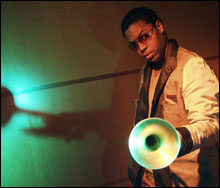 The first time I saw trumpeter Christian Scott play was at Sweet Lorraine’s in his hometown of New Orleans a couple of years ago. It was during the New Orleans Jazz & Heritage Festival and one of the locals at the Fair Grounds had touted Scott highly. My expectations were high, but not that high: a young trumpeter in the Wynton mold, someone who was very good at playing very familiar music.
The first time I saw trumpeter Christian Scott play was at Sweet Lorraine’s in his hometown of New Orleans a couple of years ago. It was during the New Orleans Jazz & Heritage Festival and one of the locals at the Fair Grounds had touted Scott highly. My expectations were high, but not that high: a young trumpeter in the Wynton mold, someone who was very good at playing very familiar music.
But Scott and his young band took me by surprise. I don’t think they played a 4/4 swing rhythm all night. Instead, they played grooves, interlocking patterns of funk and rock beats that often built to dense webs of cross rhythms. As a soloist, Scott liked to lay back on the beat, beginning in the lower register, outlining a melody with long tones, then building longer lines, coming to a slow boil that exploded in a series of high-register trills. He had a big, mature sound. And there was an edge to it — especially when he leaned on a blue note or let rip a repeated burst of notes, he brought to mind the word the late hard-bop chronicler David H. Rosenthal used in referring to Lee Morgan: “menace.” Scott was 21 years old.

Scott, now 23, has just released Rewind That, his first album on the big jazz label Concord, and he comes to Scullers with his band next month. We talked for the first time back in February in the lobby of the Marriott Copley. Scott, who now lives in New York, had played a showcase the night before at Saint. He laughed when I told him about my first impressions: “Menace . . . I like that.”
He was soft-spoken, relaxed, deferential, lounging back on the lobby couch, taking cell-phone calls from his girlfriend, the virtuoso young bassist and Berklee teacher Esperanza Spalding. Anything but menacing.
Scott, like Marsalis, comes from New Orleans royalty. His maternal grandfather, Donald Harrison Sr., was one of the biggest of the city’s Mardi Gras Indian Big Chiefs. And Christian had begun touring with his uncle, former Jazz Messenger Donald Harrison Jr., when he was 14. Scott speaks eloquently about the city (his family’s home in the Ninth Ward was essentially destroyed by Katrina, and his mother is now living in Houston). In my trips to the city, I’d always been impressed at the discipline of its young brass bands. These were inner-city kids in baggy shorts and football jerseys, mixing hip-hop rhythms and rap with “second line” parade patterns while quoting Coltrane and Charlie Parker solos. In any urban center in America, they’d be working two turntables, a microphone, and a sampler, not trumpets, trombones, tubas, and parade drums.
“I think one of the main reasons is that it’s accessible,” Scott says of instrumental music. “People see it all the time. In New Orleans, there’s hip-hop and rap music that’s prevalent, but it’s not something that you see all the time. For a kid to pick up a trumpet isn’t something that’s as hard as getting an MPC and microphone and a recording system. Just on a lot of practical levels, it’s very pragmatic to play brass-band music or jazz music, instrumental music, in New Orleans.”
Scott is plain-spoken about what it’s like to play in brass bands. “New Orleans is a dangerous place to live and grow up. And typically, it’s also the type of culture where people are allowed to do things like carry beer in the streets. So a lot of time you’re in close proximity to disinhibited people.”
Young black men, Scott says, are threatened with danger from “both sides” — the city’s criminal element and law enforcement, with its “sweeps” of black neighborhoods. “I was raised to believe that you didn’t have to do anything wrong to be locked up for the rest of your life. You get to be 16 or 17 years old and you realize that all of the boys around you are either dead or incarcerated, and you start to think, ‘How am I going to get out of this situation?’ ” The answer isn’t surprising: “you’re either going to be a ball player or an entertainer.”
It was Scott’s grandfather, not his Uncle Donald, who started him listening to jazz. A high-school student at the city’s Center for Creative Arts, he “listened to Clifford Brown all day every day.” It wasn’t until he got to Berklee that he started listening seriously to rock. One of the reasons he chose Berklee over Juilliard was because he wanted to meet “all kinds of musicians.”